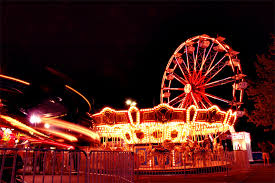记忆方法
carnival:嘉年华就是从这个词音译的——狂欢节。
中文词源
carnival 嘉年华
来自拉丁短语carne levare(同lever, 举起), 把肉收起来,绝食。原指基督教40天大斋期前的狂欢,后俗化为carne vale, 与肉说再见,-val, 力量,词源同value, valediction(临别致辞,祝好,再见)。
英语词源
- carnival
-
carnival: [16] Etymologically, carnival means ‘raising flesh’ – that is, the ‘removal of meat’ from the diet during Lent (carnival was originally a period of merrymaking preceding Lent). It comes from medieval Latin carnelevāmen, a compound noun made up of carō ‘flesh’ (source of English carnal) and levāmen, a derivative of the verb levāre ‘lighten, raise’ (source of English lever, levity, and levy).
=> carnal, carrion, lever, levy - carnival (n.)
- 1540s, "time of merrymaking before Lent," from French carnaval, from Italian carnevale "Shrove Tuesday," from older Italian forms such as Milanese *carnelevale, Old Pisan carnelevare "to remove meat," literally "raising flesh," from Latin caro "flesh" (see carnage) + levare "lighten, raise, remove" (see lever (n.)). Folk etymology is from Medieval Latin carne vale " 'flesh, farewell!' " Meaning "a circus or fair" is attested by 1931 in North America.
权威例句
- 1. The avenues lined with jacaranda trees burst into a carnival of purple.
- 大街的两旁种着蓝花楹,绽放的花朵汇成一片紫色的海洋。
- 2. The countdown to the Notting Hill Carnival is in its final hours.
- 诺丁山狂欢节已经进入了最后几个小时的倒计时。
- 3. Towards evening the carnival entered its final stage.
- 临近傍晚时,狂欢节进入最后阶段。
- 4. It's like one enormous street carnival here.
- 这就像是一场盛大的街头狂欢节。
- 5. There is a local carnival every year.
- 当地每年都举行狂欢节。
